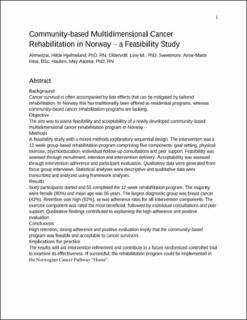Community-based Multidimensional Cancer Rehabilitation in Norway – a Feasibility Study
Journal article, Peer reviewed
Accepted version
Permanent lenke
https://hdl.handle.net/11250/3040183Utgivelsesdato
2022Metadata
Vis full innførselSamlinger
Sammendrag
Background: Cancer survival is often accompanied by late effects that can be mitigated by tailored rehabilitation. In Norway this has traditionally been offered as residential programs, whereas community-based cancer rehabilitation programs are lacking. Objective: The aim was to assess feasibility and acceptability of a newly developed community-based multidimensional cancer rehabilitation program in Norway. Methods: A feasibility study with a mixed methods explanatory sequential design. The intervention was a 12-week group-based rehabilitation program comprising five components: goal setting, physical exercise, psychoeducation, individual follow-up consultations and peer support. Feasibility was assessed through recruitment, retention and intervention delivery. Acceptability was assessed through intervention adherence and participant evaluation. Qualitative data were generated from focus group interviews. Statistical analyses were descriptive and qualitative data were transcribed and analyzed using framework analyses. Results: Sixty participants started and 55 completed the 12-week rehabilitation program. The majority were female (80%) and mean age was 56 years. The largest diagnostic group was breast cancer (42%). Retention was high (92%), as was adherence rates for all intervention components. The exercise component was rated the most beneficial, followed by individual consultations and peer support. Qualitative findings contributed to explaining the high adherence and positive evaluation. Conclusions: High retention, strong adherence and positive evaluation imply that the community-based program was feasible and acceptable to cancer survivors. Implications for practice: The results will aid intervention refinement and contribute to a future randomized controlled trial to examine its effectiveness. If successful, the rehabilitation program could be implemented in the Norwegian Cancer Pathway “Home”.

